- Home
- Jessi Kirby
Moonglass
Moonglass Read online
Contents
1
2
3
4
5
6
7
8
9
10
11
12
13
14
15
16
17
18
19
20
21
22
23
24
25
26
27
28
For my family
Acknowledgments
I’ve always heard that in life we gravitate toward people who embody the qualities we most admire, and for me it’s absolutely true. Especially when it comes to the people I’ve had the privilege to know and work with thus far.
First off are two women I couldn’t respect or adore more: my agent, Leigh Feldman, who I’ve loved since the day we met for her honesty, integrity, and the witty kind of irreverence I’ve always wanted to have; and my editor, Alexandra Cooper, whose graceful and incisive hand is moved by a passionate enthusiasm that won my heart the very first time we spoke. I have so much gratitude for these two and their indispensible assistants, Eric Amling and Ariel Colletti. I would also like to thank Justin Chanda and the entire team at Simon & Schuster Books for Young Readers for making me feel like a member of the family from the very beginning. And I owe a very special thank-you to designer extraordinaire, Krista Vossen, whose cover still makes me smile giddily.
On the writing end, I wouldn’t have a book without two stellar critique partners I’m lucky enough to read with and learn from: Jonathan Stephens and Kirsten Rice. The two of you have taught me more than you know or I can even put into words. Here’s to many more exchanges of drafts and ideas, encouragement, and honest opinions. Speaking of honest opinions, I cannot forget the very first person to read the entire manuscript (as I wrote it!), and give me hers: Carol Abifadel, who happens to be kind of a genius and one of my very dear friends.
Most importantly, I owe a love-filled thank-you to my friends and family who cheered me on and believed in me when I said this was what I wanted to do. Especially my husband, Schuyler, who never ceases to amaze me with the depth of his patience, generosity of his heart, and knack for helping me out with my dialogue.
I am a lucky girl to have you all, and not a day goes by that I don’t remember that.
I read once that water is a symbol for emotions. And for a while now I’ve thought maybe my mother drowned in both.
I watch as the wind whips long blond hair around her face. Whitecaps glimmer in the lights from the pier. She doesn’t flinch as the cold hits her. She’s numb from feeling too much, and she has shut it all out. Her eyes are focused on an invisible horizon, and she walks straight out. The waves slap at her, plastering her gauzy skirt to her legs. She’s in up to her chest, and now, as the water surges, she breathes in sharply, involuntarily, because of the cold.
Her mind is clear at this moment. Nothing but the purity of the cold and the possibility of total peace. She bends her knees and lets the water hit her chin, takes some of the bitter saltiness into her mouth, then lets it run out, eyes still focused on the beyond. She doesn’t take a breath before going under, but exhales completely and dissolves into the blackness without thinking about anything.
Not even me.
Rain and wind pelted the ocean’s surface so hard it looked like it was boiling. In the passenger seat of our VW bus, I shivered despite the warm, muggy air. My dad jumped into the driver’s seat and shook the rain off.
“Weird summer storm, huh?” Water dripped from his face as he tried to catch my eye.
I looked away.
“You ready? Sure you’ve got everything?”
“Yep. Got it all.” I paused, staring straight out the windshield. “Oh, wait—except for my friends, my school, my life …”
“Anna—”
“I know. I’m gonna love it there. It’ll be just great.”
He started to say something but shook his head instead, cranked the key, and turned the music up to a volume that made it clear we were finished talking. I felt a pang of regret for being like that with him, but kept my eyes on the beach that he’d decided, without even asking me, to leave. The beach where I’d found a simple peace on my morning runs, and trolled for boys with my friends on lazy summer afternoons, and where I’d caught my last waves of the day, just as the sun slipped into the ocean. It was where my life was.
And where my mother had left hers.
I couldn’t understand it any more than I could put it into words, but tangled up with my anger at my dad over moving was a sense of guilt that ran deep in me. The stretch of water here belonged to my mother. And, somehow, leaving felt horribly wrong.
I would never have said it, though, even if I thought it’d change his mind. I knew well the boundaries we’d drawn. Instead I rested my temple on the rain-cooled passenger window and watched the churning ocean disappear through a blur of gray.
The dark all around threw me off. Apparently I had actually fallen asleep while pretending to be asleep so as to avoid talking to my dad. He put the car in park and stepped out to open the locked gate in front of us. When he looked back and motioned for me to slide over to the driver’s seat, I did so grudgingly and pulled our old bus forward, far enough so he had to back up a step or two, just to see if I could make him move. He didn’t seem to notice.
“You wanna drive on down, Anna?”
It was a stab at peace. Every time we’d talked for the last few weeks, we’d argued about why I couldn’t just live with my grandma and finish out high school at home, in Pismo Beach. Either he didn’t get it or he didn’t care how unfair it was, the way he’d changed everything like it was nothing. In a week’s time he’d taken a promotion and a transfer, packed up our life, and come to the cove to start a new one. Just like that.
His generous concession was that I could stay with my grandma for the rest of the summer. So while he’d moved in and started work, I’d spent my days on the beach, trying to feel the normal fun and lightness of summer. Shelby and Laura and I went on with our summer traditions. We paddled out at the pier on the Fourth of July so we could watch the fireworks fall down like rain over our heads. We camped out on the dunes, feasting on s’mores and getting spinney on wine coolers. We snuck into the hotel pools only to be shooed out by the owners, who’d known us since forever. And we didn’t mention that I was leaving. Instead we laughed at tourist boys for their loud board shorts and backward wet suits, and then at ourselves for flirting with them anyway.
But none of it was the same. For me, everything we did was weighted with the knowledge that I was leaving and the stark realization that their lives would go on nearly the same without me once I was gone. Mine was the one that would change.
It was a lonely thought, and I tried not to think about it. I had other worries. As soon as my dad had made his decision to take the transfer, something in him had shifted. There was a distance between us that was more than the result of me being angry about moving. He was just off somehow, only half there, and it unsettled me the same way watching a storm move in over the water did. I could tell he was trying hard to hide it and somehow hold on to the careful balance it had taken us so long to build. But the moment he’d made the decision to leave, that balance was all off. Which brought us to the cove.
“No, I don’t wanna drive down.” I scooted back over to my seat, and he got in, probably resigned to the fact that I was going to draw this out.
“Suit yourself.” He sounded tired. I looked out my window, arms crossed, and he tried again. “I think when you see the place you may have a change of heart.”
When I didn’t
respond, he sighed and put the bus in gear. We rolled down a steep hill past a carved wooden sign that read CRYSTAL COVE STATE PARK. Just beyond it the road turned to dirt. He perked up and pointed out his open window to a tiny yellow cottage.
“This was the first building here, Building One. It was the check-in site for the old tent campers.” He said it like he was conducting a tour.
“Hm.” I curled my toes around the crank on the door and pushed it to crack the window. Cool salt air flowed in, and my mood lightened a little. We were definitely close to the water. The crash of the next wave confirmed it. I breathed in deeply, and my dad glanced over at me just before I could hide a small involuntary smile. He didn’t bother to hide his own as we trundled slowly across a white wooden bridge, our tires thunk-thunking over each plank.
The road made a little curve and opened up to a view that humbled me. A yellow moon hung low over calm, glassy water, creating a path of light that began at the horizon and ended with a splash on the slick sand. Just down the beach I could make out a point dotted with the silhouettes of jagged rocks, where a small wave stood up and broke with a surprisingly loud crash.
I rolled my window all the way down, and my dad broke into a grin. “This”—he motioned with his hand—“is our new front yard.” He waited for me to say something. “Not too bad, huh?”
In spite of myself I felt a little ripple of optimism rising. I looked at the row of cottages illuminated by pale moonlight, and attempted to sound only mildly interested. “So … we actually get to live here? In the park?” He nodded, obviously proud. “Which one is ours?”
He took his foot off the gas, and our tires crunched over the dirt road. “It’s right … up … here.” We came to a stop in front of a small white cottage with blue trim. Our new home. Literally on the beach. “Not bad for employee housing, huh?”
My resolve to stay mad was slipping away. Fast. I didn’t fight the genuine smile I felt spreading across my face. “Not bad.”
He got out and stood, arms stretched above his head, smiling out at the ocean. “Wanna jump in?” A wave broke, then rushed up the sand like an answer to his invitation.
“Seriously?”
“Yeah. That drive was brutal without the A/C.”
I shook my head, knowing that once I got into the water, my hard-fought battle would lose its bluster. He knew it too, and more often than not had coaxed me into a surf or a swim together to diffuse a fight. I watched for a second, torn a little between not wanting to concede and the desire to let the day’s tension slip beneath the slick surface of the water. I could swim straight out into the shining path of moonlight and let it go for now. Give it a chance. By the time I reached into my backpack to grab a bathing suit, my dad had already made his way to the water with steps so light they made me wonder if I’d been wrong about the change I’d sensed in him.
The water was warmer than I’d expected. I waded out, enjoying the slap of white water against my legs. When a wave rose in front of me, I took a breath and dove under. The familiar surge passed over me, bringing a calm kind of happiness, and I surfaced to meet the cool, fresh smell of the beach at night. Some things were the same everywhere.
I turned to float on my back and take the place in. Down on the beach it looked like a snapshot from long ago. Our beat-up VW bus parked in front of the weathered beach cottage was perfect. A simple, dreamy beach life. Sort of. Despite the calm that was all around me, I found myself almost waiting for the first ripples of the past to appear. I’d known the name Crystal Cove long before my dad had told me we were moving. According to my grandma, it was where my parents had met so many years ago, on summer vacation. My mother had been here, before I was even a thought. Maybe walked the beach, watched the sunset, went for a night swim …
My dad popped up behind me. “Almost too good to be true, huh?” His smile made him look like a kid.
I felt a momentary softness. It really was amazing, and he really was trying. Hard. “Yeah, it’s pretty great.”
“It is.” He said it almost to himself, then was quiet a long moment, and I knew what he was thinking. What he had to be thinking. I tensed and willed him not to feel the need to bring it up.
“This is where your mom and I first met, you know. Right down there on the beach.” He pointed south, suddenly wistful, and I froze. Though I’d known, hearing him say it turned my stomach.
“Yeah. I know.” I took a breath and went under, pulling myself past him beneath the surface. I didn’t want to go down this path tonight. Actually, I wasn’t sure I wanted to go down this path ever. We didn’t talk about these things. Our comfortable, mostly easy way of getting along with each other depended on not bringing up my mom. And now here we were. Amidst a whole lot of history I didn’t want to dig up.
I surfaced a few feet away and tried to sound light, but there was an edge to my voice. “Sooo, are we gonna stay out here all night, or do I get to see the place?”
My dad glanced down the beach, started to say something, and then thought better of it. “Yeah. Let’s go.” With that he looked over his shoulder just in time to catch the next wave in. I waited for another one and pushed off the sand with my toes. The swell lifted me, and I put my arms out in the face of it, gaining speed all the way to the sand.
As I stood, twisting water out of my hair, my dad strode over the sand below the dirt road in front of our house. I heard a tiny click, and a motion detector light flipped on. When it did, I noticed for the first time what looked like a condemned cottage sitting on the beach, backed up to the cliff. A drooping fence surrounded it, overgrown with ice plant, setting it apart from our row of restored cottages on the hill. I hadn’t even realized it was there. Now, though, in the yellow light, it stood like a piece of history preserved in time. The cracked windows were barely translucent from the mist and sand accumulated on them, and the whole shack leaned precariously, as if the weight of the vines sprawled over it were too much for it to bear. I shivered a little.
“Anna, you coming?” My dad reached into the bus and grabbed two towels, wrapping one around his waist. He didn’t even glance over at the dilapidated cottage. “Here. Towel for ya.” He held the other one out to me.
I fumbled with it for a second, then slung it over my shoulder, still unable to look away from the cottage. As we picked our way up the uneven stepping stones in front of our new house, I opened my mouth to ask about it, but changed my mind just as the light clicked off. I paused and squinted at the cottage in the dark, waiting for something. But there was nothing. Just the crash of another wave and the stillness that followed.
My dad put the key into the dead bolt and nudged the door with his shoulder. We stepped into hot, stale air and darkness. The smell was unfamiliar but not unpleasant—something of the old wood the cottage was built of. The light flipped on, and he went straight to opening the windows.
“Gets a little stuffy in here all closed up.” He pulled a latch and threw open another window.
In the dim light I could see that the hardwood floor had been painted over with brick red paint. The pale yellow walls were smudged and cracked. It wasn’t my grandmother’s house, that was for sure. Once my dad had gotten here, he’d called to say it probably was a good idea for me to stay back with her while he came down here to get settled. I could see why. The place wasn’t exactly homey. Not much hung on the walls or softened the emptiness of it. In the few weeks I’d spent with my grandmother, I had grown accustomed to a comfortable life. She doted on me like I pictured her doting on my dad as a kid, complete with a commercial-perfect breakfast every morning and clean sheets every Sunday. Here I could see that wouldn’t be the case.
He must have seen it on my face. “I know. It needs some help. We’ll have plenty of time for that. I’ve been putting in a lot of hours since I got here.” I nodded skeptically, eyeing his sunburned face. “Plus, I figured maybe you’d have fun decorating.” I was silent. “Hey. I got started.” He gestured to a set of shelves in a little alcove.
In his own way he had tried. Scattered over the shelves were pictures of us that I knew were his favorites. Almost all were images of us smiling at the camera from a boat or our surfboards, happy and tanned. Between the picture frames were a few seashells—his attempt at decorating. I set my bag down.
“As long as you’re forcing me to be here, I guess there are a few things I could do with the place.” I gestured at the giant picture window framing the moon and the water. “I don’t think we should put curtains up there. It’s too pretty to cover up.” We looked out at the water, quiet, and it felt like one of those moments that was heavy with the things we didn’t want to say out loud.
“Well, come on. I’ll give you the full tour.” He put a hand on my shoulder and steered me through a narrow doorway, then flipped another light switch. “This”—he swept his arm over a bare room with a bed in the middle—“is my room.”
“Wow, Dad … this is depressing.” I glanced around. On his ancient dresser was a plate-size abalone shell he had found on a dive in Mexico. Another attempt at decorating. Above it hung a black-and-white picture of my mom, from when they had first met. At this beach. In it she stood at the waterline looking down, like she was unaware of the camera. She wore a white sundress and a calm almost-smile. I squinted to see if I could glimpse any of the cottages in the background, but then felt my dad looking at it too, starting to get lost in the thought of it again.
I clapped my hands together and looked around. “So. Where’s my room?”
“Well, you have to go through my room to get to yours, but you have an outside door too.” My mind hummed at the potential of this as I followed him past his bed and to another doorway. He stopped, hand on the doorknob to my room, and turned abruptly to face me, so that I almost ran into him.
“Listen.” He took me by the shoulders. “I know I asked a lot of you, to pick up and move.”
My eyes welled up instantly, for too many reasons to name.

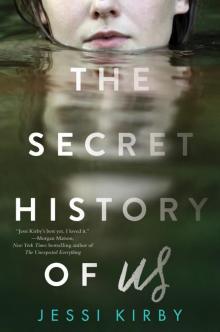 The Secret History of Us
The Secret History of Us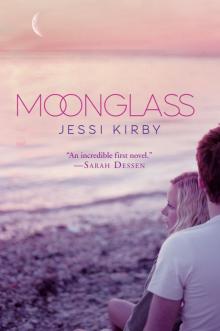 Moonglass
Moonglass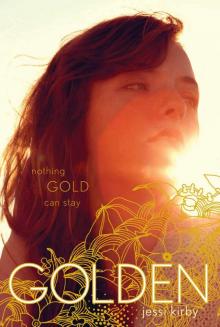 Golden
Golden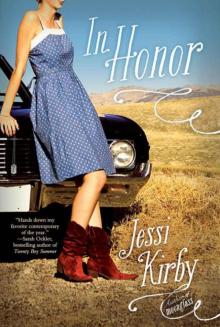 In Honor
In Honor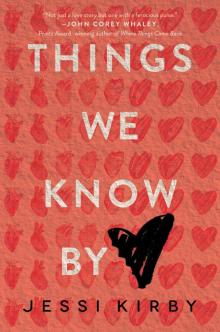 Things We Know by Heart
Things We Know by Heart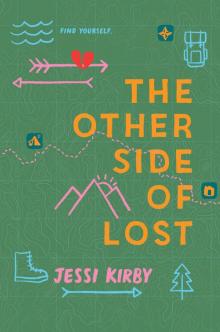 The Other Side of Lost
The Other Side of Lost